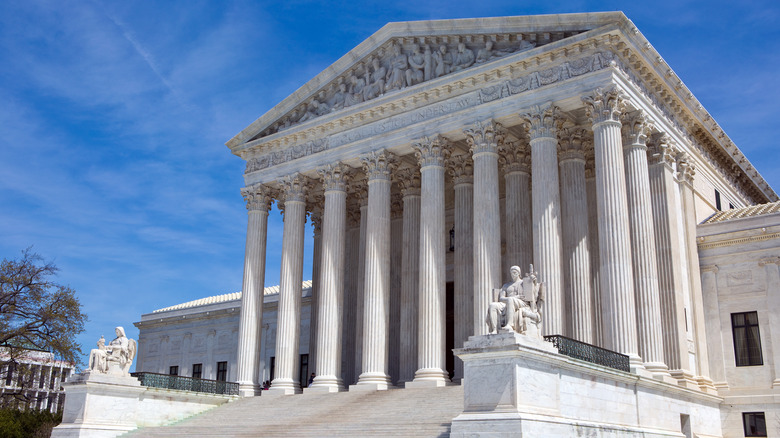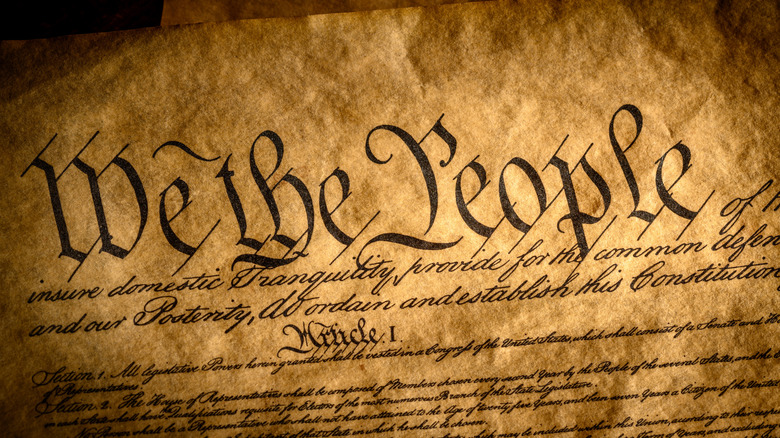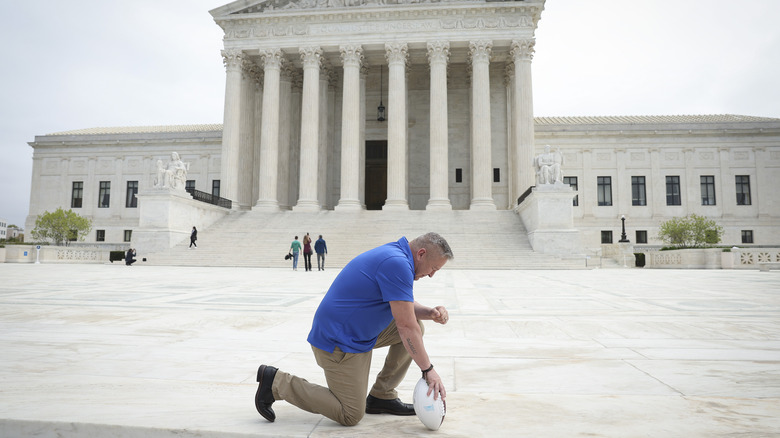What Is The Lemon Test And Why Did The Supreme Court Rule On It?
A controversial Supreme Court ruling has been brought up in hearings in June 2022, more than five decades after it was first created, according to CNN. With a new case on the Supreme Court's docket that was just decided, the Lemon test has been under scrutiny. What is the Lemon test, and why have the Supreme Court Justices been discussing this 50-year-old ruling now?
The Lemon test stems from the 1971 Supreme Court case of Lemon v. Kurtzman (per Middle Tennessee State University). Two states, Rhode Island and Pennsylvania, had created rules in their school districts about how school expenses should be handled. In this state legislation, tax dollars would be used to help fund both public schools and private religious schools. School administrators could use the extra funds to pay teachers, buy supplies, or buy textbooks.
But not every tax-payer thought that this was a proper use of government funding, since the money was being used by religious schools. The case of Lemon v. Kurtzman went forward in the highest court in America.
A salary increase leads to a Supreme Court case
The case of Lemon v. Kurtzman was a nuanced ruling that ended up creating the Lemon test, with three sections to prove if a group is acting within their Constitutional rights (per Justia).
In this case, it meant that Rhode Island wanted to give their teachers at nonpublic schools a 15% salary increase to keep up with the high cost of education. But the teachers had to spend that money only to teach the same courses that would also be taught in public schools, while using the exact same textbooks and educational materials that the public schools used. These private-school teachers would also have to abstain from teaching religious classes in order to qualify for the salary supplement. The money was mainly going to Catholic schools: about one in four children went to a nonpublic school at that time, and 95% of those children were enrolled in Catholic schools. Per Pew Research, the plan for Pennsylvania went even further, asking for federal funds to reimburse private schools when they taught secular classes.
The question Lemon v. Kurtzman was asking the Supreme Court was: How involved can the government be when it comes to religious practices in private and public settings? According to the United States Courts, the ruling provided a useful three-part test to determine the answer to that question.
Three parts of the Lemon test
What's referred to as the Lemon Test has three parts. First, the United States can help with religious activities — but only if the main reason they are helping is for a secular (or non-religious) reason (via United States Courts). Second, the government must remain neutral about religion. The government can't advocate for any one religion, and it can't punish people for practicing or not practicing religious beliefs. Third, there must be no "excessive entanglement" as the government makes these decisions.
Pew Research reports that this third part of the clause means that the government can't be heavily involved in religious activities — so in the case of Lemon v. Kurtzman, the government would have to keep tabs on the school's lesson plans and spending. That was determined to be too much interference in religious business. Even though Pennsylvania and Rhode Island schools met one part of the Lemon test, they did not meet all three. Therefore, the Supreme Court said, what these two states were advocating for was unconstitutional. Per Middle Tennessee State University, if the arrangement between the government and the other party failed any of the three rules of the Lemon test, the whole thing would become unconstitutional.
Separating church and state
Middle Tennessee State University reports that for decades afterward, the ruling cemented the divide between the church and the American government. But not everyone was happy with the ruling, or even agreed with all of the parts of the Lemon test.
Some Supreme Court justices have disagreed with the Lemon test, believing it is far too strict on the separation of church and state (via Pew Research). The 1971 ruling has been cited numerous times over the years in cases about prayer in school (per Britannica). This was also the rule in instances like Stone v. Graham, a 1980 case where school officials wanted the 10 Commandments hung in every room of a public school (via Britannica). The Court cited the first rule of the Lemon test as a reason why it was unconstitutional, and the school lost the case. The Lemon test has come back into discussion recently with a case on the court's docket in June 2022, per CNN.
Kennedy v. Bremerton School District brings the Lemon test into question
A high school football coach, Joe Kennedy (above), had been praying on the field after football games. Sometimes students prayed with him (via CNN). The coach lost his job because he refused to stop praying on the football field. The Supreme Court ruled that this was unconstitutional in Kennedy v. Bremerton School District — Kennedy should not have lost his job because that would violate his first amendment right to private speech.
Per Middle Tennessee State University, six of the nine Supreme Court Justices argued that the Lemon test has not been applied equally throughout its history, and that it is an antiquated piece of legislation. Some justices, like Neil Gorsuch, who authored the majority opinion, say that the rule has historically meant that the government was "hostile" toward religion (via CNN).
The court ruled on another case just days earlier, also in June 2022 (per CNN). This case asked if religious schools can receive government funding through a voucher system. Families in Maine were relying on a voucher system to choose which school to send their child to.
Religious schools can't be excluded, the Supreme Court rules
The Supreme Court decided that if families couldn't obtain vouchers for private religious schools, that means religious schools are excluded just because they are religious, according to CNN. In a 6-3 ruling, the Supreme Court decided in favor of the religious schools, allowing them to participate in the voucher system. Parents can now send their children to either a public or private school with the government vouchers.
As Bloomberg Law reports, the separation of church and state isn't exactly overruled. However, it will certainly have a ripple effect across lower courts and other areas of government that had relied on the Lemon test to help separate church and state constitutionally.
This Supreme Court has made it clear with this ruling that they won't be using the Lemon test to support their future court cases. And, per CNN, the ruling will almost certainly open the door for an influx of future cases regarding freedom of religious expression in America.





